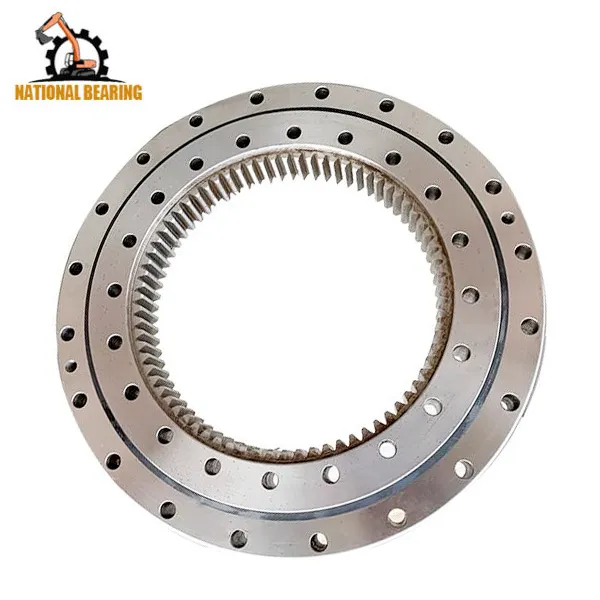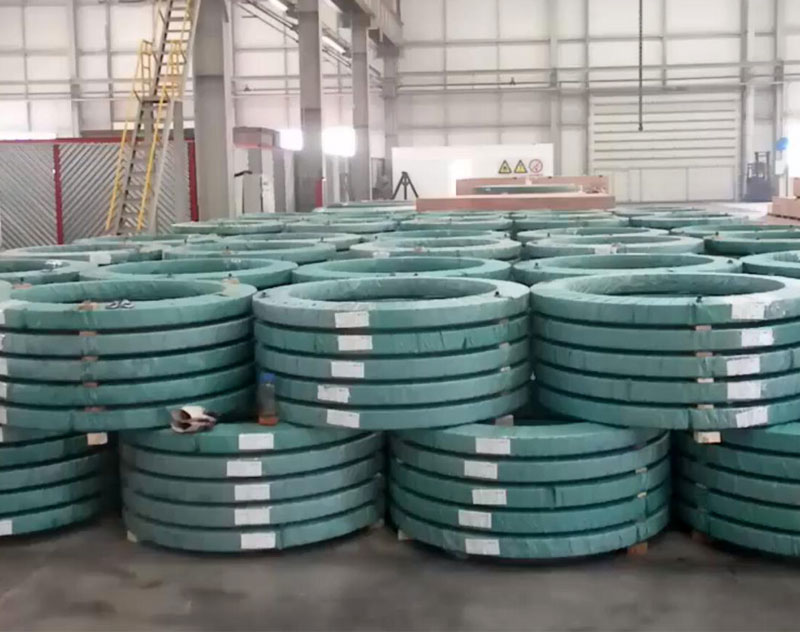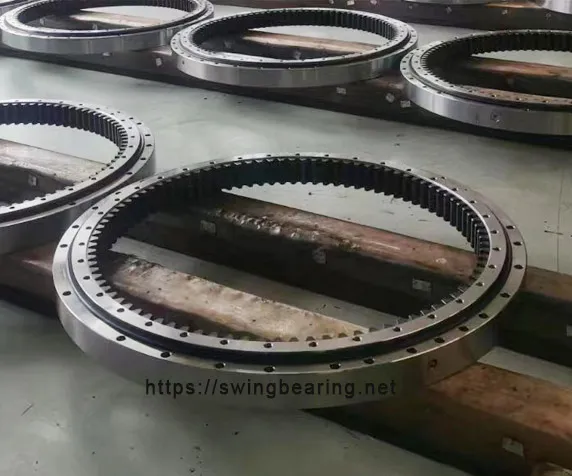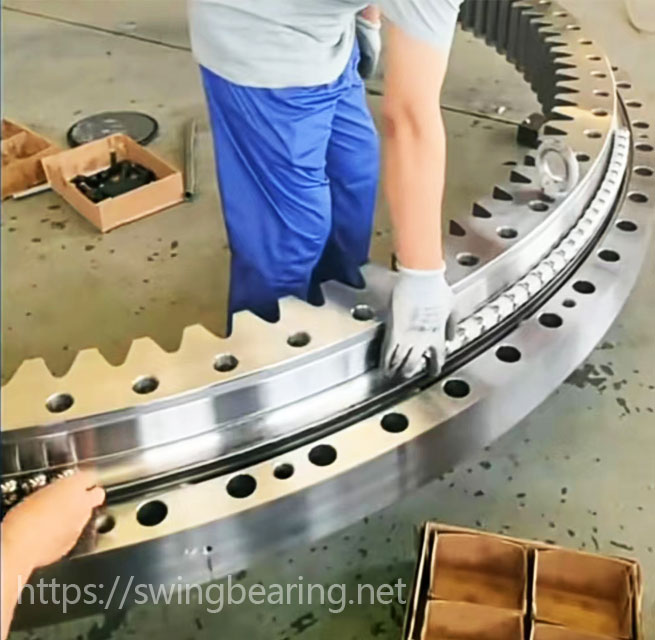
Turntable bearings are essential components in excavators, ensuring the stability and smooth operation of these powerful machines. Designed to enable a full 360-degree rotation, turntable bearings are critical for the efficient movement of materials and effective excavation operations. This article provides an in-depth overview of Ρουλεμάν περιστρεφόμενου δίσκου εκσκαφέα, highlighting their key components, functions, and maintenance practices.
In the realm of heavy machinery, excavators are indispensable for various construction and excavation projects. One of the most critical components that facilitate the excavator’s versatility and functionality is the turntable bearing. This component not only supports the machine’s weight but also allows for seamless rotational movement, which is essential for precise digging and material handling. Recognizing the importance of turntable bearings, Xuzhou National Construction Machinery Co., Ltd. has been a leading manufacturer of high-quality turntable bearings, ensuring reliability and durability in construction machinery.
Turntable bearings for excavators are composed of three primary components: the inner race, outer race, and rolling elements (which can be balls or rollers).
The inner race is a cylindrical ring that is fixed to the excavator’s upper structure. It serves as one of the two main surfaces that interact with the rolling elements to facilitate rotation. The inner race is engineered to handle significant stress and must be precisely aligned to ensure smooth operation.
The outer race is a circular ring bolted to the lower structure of the excavator. Like the inner race, it also interfaces with the rolling elements. The outer race must be robust and securely attached to support the overall structure of the excavator.

Placed between the inner and outer races, the rolling elements are responsible for reducing friction and enabling smooth rotation. Depending on the design, these elements can be either balls or rollers. Ball bearings are typically used for applications requiring high-speed rotation, while roller bearings are preferred for handling heavier loads.
The primary function of a turntable bearing is to provide a solid and stable connection between the upper and lower structures of the excavator while allowing for efficient and precise rotational movement. This function is critical for several reasons:
Turntable bearings help distribute the weight of the excavator evenly over its tracks. This distribution is crucial for maintaining stability, especially when the excavator is operating on uneven terrain or handling heavy loads. Without a stable turntable bearing, the risk of tipping or imbalance increases significantly.

Precise and controlled rotation is vital for accurate excavation and material handling. The turntable bearing ensures that the upper structure of the excavator can rotate smoothly, allowing the operator to position the bucket or other attachments with high precision. This control minimizes operational downtime and enhances the efficiency of excavation tasks.
Turntable bearings play a significant role in distributing axial, radial, and tilting moment loads across the excavator’s structure. By effectively managing these forces, turntable bearings contribute to the overall durability and performance of the machine.
Proper maintenance of turntable bearings is essential to maximize the performance and longevity of excavators. Regular inspection and maintenance can prevent unexpected breakdowns and extend the lifespan of the bearing.

Regularly inspect the turntable bearing for signs of wear, such as unusual noises, increased rotational resistance, or visible damage to the races or rolling elements. Early detection of issues can prevent more severe damage and costly repairs.
Lubricating the turntable bearing is crucial to ensure smooth operation and reduce wear. Use the appropriate type of grease as recommended by the manufacturer, and ensure it is applied evenly. Proper lubrication helps in minimizing friction and protecting the bearing from corrosion.
If the turntable bearing shows significant signs of wear or damage that cannot be rectified through maintenance, it should be replaced promptly. Delaying the replacement of a damaged bearing can lead to catastrophic failures and pose safety risks.

Turntable bearings are indispensable components in excavators, playing a crucial role in their stability, functionality, and efficiency. Investing in high-quality turntable bearings and adhering to regular maintenance schedules can significantly enhance the performance and lifespan of excavators. Xuzhou National Construction Machinery Co., Ltd. is a trusted manufacturer providing reliable turntable bearings that meet the demanding requirements of construction machinery. By understanding the key components and functions of turntable bearings, operators can ensure their excavators operate smoothly and efficiently, making these bearings a worthwhile investment.
A: The key components of a turntable bearing include the inner race, outer race, and rolling elements (balls or rollers). The inner race is fixed to the excavator’s upper structure, the outer race is bolted to the lower structure, and the rolling elements are placed between the two races to facilitate smooth rotation.
A: Turntable bearings play a vital role in enhancing the stability of an excavator by facilitating smooth rotation and weight distribution. In an excavator, turntable bearings support the upper structure of the machine, allowing it to rotate horizontally. This rotation is essential for the excavator to perform various tasks effectively, such as digging, lifting, and dumping materials.
The even distribution of the excavator’s weight over its tracks is crucial for maintaining stability, especially when operating on uneven terrain or when lifting heavy loads. Turntable bearings help distribute the weight evenly, reducing the risk of tipping over or imbalance. By providing a stable base for the excavator to operate on, turntable bearings contribute significantly to ensuring safe and efficient working conditions.
Furthermore, turntable bearings enable the excavator to pivot smoothly, allowing for precise movement and positioning during operation. This smooth rotation is essential for the excavator to maneuver effectively in tight spaces and perform tasks with accuracy. Overall, the role of turntable bearings in enhancing the stability and maneuverability of an excavator is indispensable for its overall performance and safety.
A: Lubrication is essential for turntable bearings to ensure optimal performance, longevity, and reliability. Turntable bearings operate under high loads and continuous rotation, which can generate heat and friction. Without proper lubrication, the bearings can experience increased wear, leading to premature failure and reduced efficiency.
Lubrication helps to minimize friction between moving components within the turntable bearings, facilitating smooth rotation and reducing heat buildup. By reducing friction, lubrication also helps to prevent unnecessary wear and tear on the bearing surfaces, extending their lifespan and minimizing the need for frequent maintenance or replacement.
Additionally, lubrication plays a critical role in protecting turntable bearings from corrosion and contamination. Dust, dirt, and moisture can infiltrate the bearing assembly, causing damage and affecting performance. Proper lubrication forms a protective barrier, preventing external elements from compromising the integrity of the bearings and ensuring their smooth operation over time.
A: If a turntable bearing exhibits significant wear or damage, it should be replaced promptly. Delaying replacement can lead to severe failures and pose safety risks. Regular inspection and maintenance can help detect issues early and prevent costly repairs.
By addressing these common questions, operators can better understand the importance of turntable bearings and the steps necessary to maintain their excavators’ optimal performance.